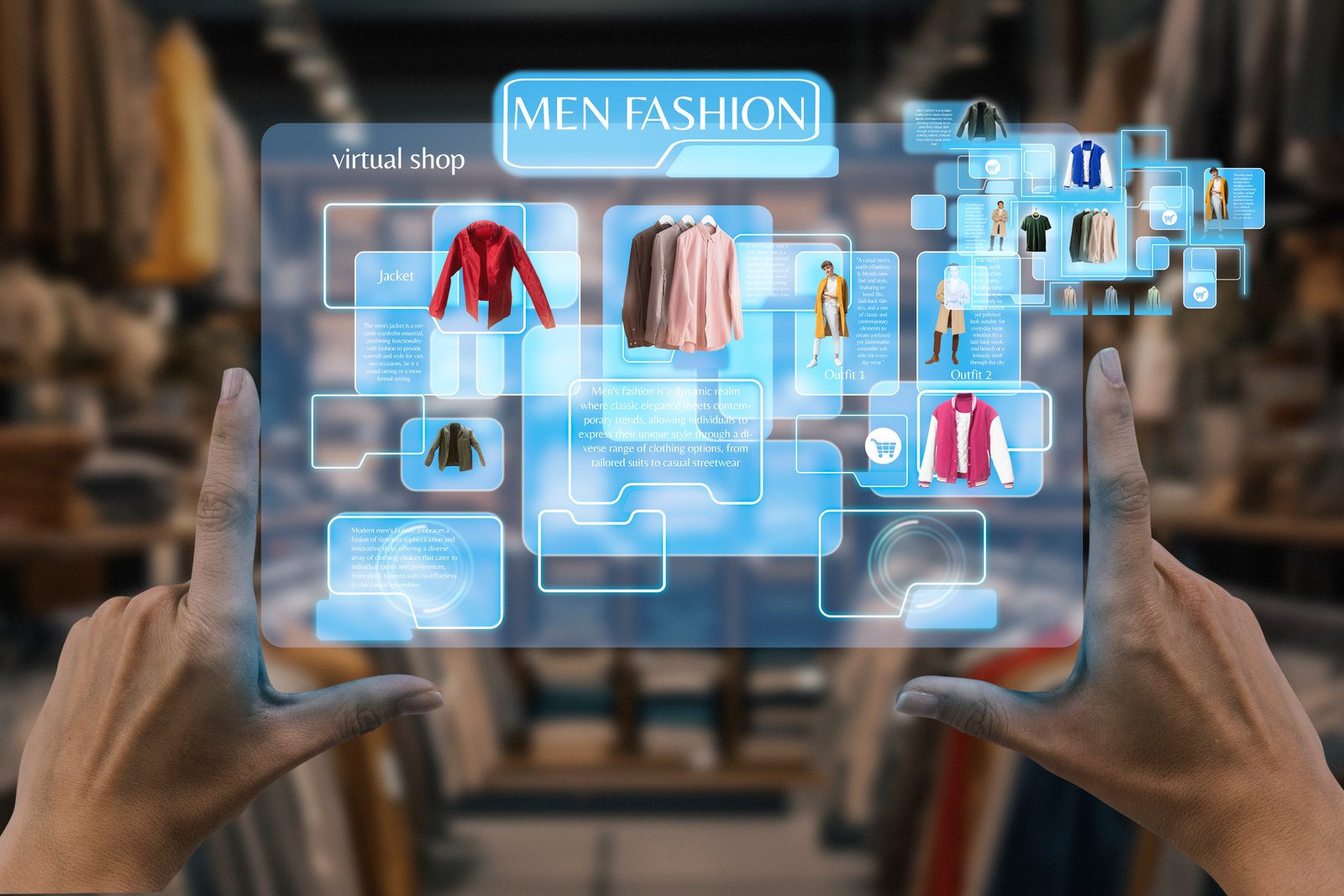The dawn of artificial intelligence in retail is changing how we shop online. It’s making our digital shopping experiences more personal than ever. But how do these smart algorithms know exactly what we want?
Companies use AI to study our online habits. They look at what we browse, buy, click, and how long we stay on pages. This lets them offer us a shopping experience that’s just for us.
Picture this: you log into your favorite online store and see products and deals picked just for you. This is what AI in online shopping can do. It creates a market that changes with you, offering deals based on what you like and when you want them.
New companies like Stitch Fix, Clerk.io, and Vue.ai are leading the way. They use AI to make shopping better for everyone. Their tech gives us personalized search results and recommendations, changing how we shop online.
We’re on the edge of something big with AI and commerce. Soon, we’ll see more augmented reality, voice shopping, and smart customer service bots. These are just a few signs of how AI is changing the retail world.
Elevating Customer Experiences with AI in E-Commerce
AI for customer experience is changing how businesses talk to customers. E-commerce sites use automated personalization tools to make shopping better. This makes customers happier and more loyal.
AI helps make personalized e-commerce experiences for each customer. It looks at what they’ve bought and what they like. This makes shopping more fun and increases sales by up to 31%.
AI also makes talking to customers easier with virtual assistants and chatbots. They answer questions fast, which 62% of people like better than waiting for a human. Quick answers make customers happier and more loyal.
AI also helps with prices and how much stock to keep. It changes prices based on what people want and what’s available. This way, businesses can sell more without losing money. AI also helps manage stock, so there’s just enough for what customers want.
In short, AI in e-commerce is a big change. It’s all about using data to make shopping better. Small businesses can start with simple AI tools like chatbots. Then, they can add more advanced systems to grow and improve customer service.
AI-Driven Personalization in E-commerce: Tailoring the Digital Marketplace
The future of e-commerce is being shaped by AI-powered personalization. This tool improves customer experience and makes operations more efficient. Retailers are quickly adopting personalized e-commerce experiences to meet their customers’ unique needs. This boosts engagement rates a lot.

AI-powered personalization has a big impact, especially in product recommendations. Big names like Amazon use these systems to suggest items based on what you’ve looked at and bought. This increases their sales a lot. Netflix also uses AI to suggest shows you might like, making users happier and keeping them coming back.
AI also changes how we interact with online stores. For example, chatbots and virtual assistants give shoppers quick and relevant help. Sephora uses AI chatbots to give beauty advice that fits each customer’s style. This makes their service better and keeps customers loyal.
But, there are challenges in using personalized e-commerce experiences. Retailers face issues like data privacy and making AI work well. Yet, the future of AI in e-commerce looks bright. We can expect better natural language processing and real-time analytics, making personalization even better.
As e-commerce gets more advanced with AI, businesses that use AI-powered personalization will see big wins. They’ll make more money, get more customers, and be more efficient in marketing. This change is not just a trend; it’s a big shift towards a more digital and personalized retail future.
Behind the Scenes: AI’s Impact on Inventory and Logistics
The use of AI in retail logistics is changing how online stores manage their supply chains and stock. AI helps retailers use real-time data to improve sales forecasting in e-commerce. This leads to better stock management and lower costs. AI can quickly analyze huge amounts of data, making smart logistics possible that adapt to market changes.
AI in e-commerce not only predicts what customers will buy but also helps with restocking and pricing. This makes businesses more efficient and profitable. Stores using AI see better service levels, faster delivery, and happier customers. This is key for keeping customers in the fast-paced online world.
Using AI for e-commerce logistics helps meet fast delivery expectations. Research shows that 99% of online shoppers want quick delivery. AI helps companies handle logistics better, cutting down delivery times and costs. This makes customers happier and more loyal.
The future of e-commerce depends on using AI to grow and stay efficient. With the e-commerce AI market expected to hit nearly $45.72 billion by 2032, AI in inventory and logistics is here to stay. It’s a shift towards smarter, more responsive online stores.
The Future of AI in E-commerce: Beyond the Shopping Cart
The digital marketplace is changing fast. AI-driven personalization in e-commerce is key for brands to keep up. 84% of e-commerce businesses are using AI to meet the 71% of consumers who want personalized shopping.
AI is changing how we shop. Tools like chatbots and virtual assistants use Machine Learning (ML) and Natural Language Processing (NLP). They make shopping more personal and interactive.
Many consumers, 62% of them, are eager to use AI to make shopping better. Brands that offer personalized experiences see 78% of shoppers coming back. This trend is growing fast, with AI in e-commerce expected to hit $24 billion by 2027.
Big e-commerce players are using AI to predict sales with 95% accuracy. AI also adjusts prices up to 2.5 million times a day. This keeps prices right for the market.
Voice shopping is the next big thing in e-commerce. It makes buying easy and hands-free. With AI, voice shopping could change online shopping forever.
AI is also making online shopping more personal. It uses Computer Vision for visual search and virtual try-ons. This makes shopping more fun and accurate.
AI can boost revenue by 10-15% and cut costs by 30%. It’s changing e-commerce into a powerful tool for growth and customer happiness.

